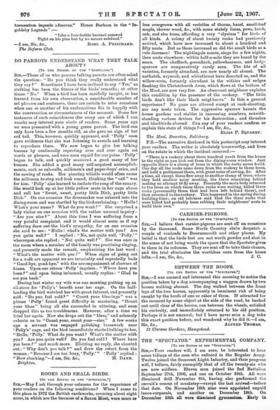DO PARROTS UNDERSTAND WHAT THEY TALK ABOUT P
pro THE EDITOR OP THE "SPECTATOR"] Six,—Those of us who possess talking parrots are often asked the question : " Do you think they really understand what they say ? " Sometimes I have been inclined to say "Yes," so striking has been the fitness of the birds' remarks; at other times "No." When a bird has been carefully taught, or has learned from his own observation, a considerable number of set phrases and sentences, there are certain to arise occasions when one or another of his exclamations fits in happily with the conversation or circumstances of the moment. Some few instances of such coincidences (for every one of which I can vouch) may interest your circle of readers. Some years ago we were presented with a young green parrot. The bird can only have been a few months old, as she gave no sign of her red tail. This, however, quickly appeared, and ' Polly' soon gave evidences that she was listening to sounds and learning to reproduce them. We now began to give her talking lessons by continually repeating over and over again set words or phrases, and were soon repaid for our pains. 'Polly' began to talk, and quickly mastered a good many of her • lessons. She added a good many self-acquired accomplish- ments, such as cab-calls, milkmen's and paper-boys' cries, and the cawing of rooks. Her piercing whistle would often cause the milkman to stop and look round, thinking the "call" was for him. 'Polly' also learned to imitate the song of the canary. She would look up at her little yellow mate in her cage above and call her "Sweet, sweet, pretty little Dick, pretty little Dick." On one occasion the dressmaker was ushered into the dining-room and was startled by the bird exclaiming : "Hullo ! What's your name P What do you want? " She surprised a lady visitor on one occasion with the rather unusual inquiry : "Are you nice P" About this time I was suffering from a very painful complaint, and it would almost seem as if my suffering drew out the bird's sympathy, for on one occasion she said to me : "Hullo ! what's the matter with you ? Are you quite well P " I replied : "No, not quite well, 'Polly," whereupon she replied : " Not quite well P " She was once in the room where a member of the family was practising singing, and presently made the remark, emphasising the last word : " What's the matter with you ? " When signs of going out for a walk are apparent we are invariably and repeatedly bade " Good-bye, good-bye," with the accompaniment of showers of kisses. Upon our return 'Polly' inquires : " Where have you been ?" and upon being informed, usually replies : "Glad to see you back."
During last winter my wife was one morning putting up an
oil-stove for Polly's ' benefit near her cage. On the half- landing the bird watched her with great interest, and presently said : "Do you feel cold?" "Count your blessings" was a phrase 'Polly' found great difficulty in mastering, "Count your bless" being all she succeeded in uttering, and soon dropped this as too troublesome. However, after a time we tried her again. Now she drops out the "bless," and solemnly exhorts us to "Count your, count your—sins." A few weeks ago a servant was engaged polishing brasswork near
Polly'a' cage, and the bird immediately started talking to her.
"Hello, 'Polly.' What do you want P What's the matter with you P Are you quite well P Do you feel cold ? Where have you been ? " and much more. Eliciting no reply, she shouted out : " Why don't you talk P" and drew the retort from the woman : " Because I am too busy, Polly.' " Polly' replied :
"How shocking."—I am, Sir, &a., H. DANN. Brighton.










































 Previous page
Previous page